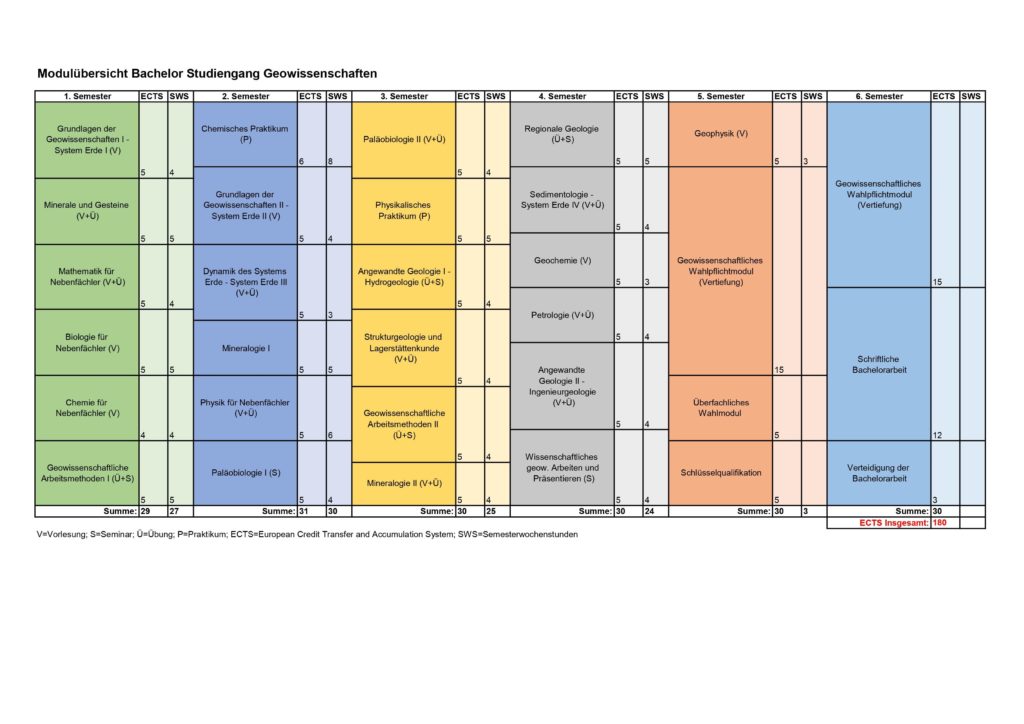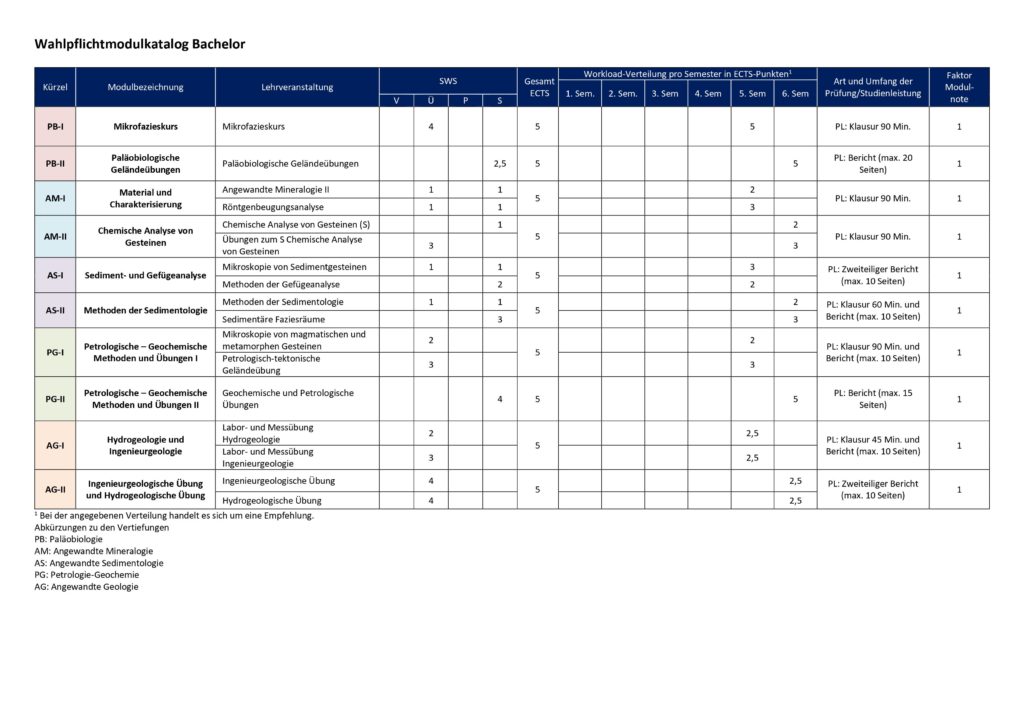Bachelors Degree in Geoscience
Registration for the Bachelors Degree in Geoscience
Information on application/registration for the Bachelors Degree in Geoscience
German language skills are compulsory to study the Bachelor Geoscience in Erlangen. All courses are taught in German.
Studies begin each winter semester!
Enrollment takes place:
1) Online via the portal www.campo.fau.de; the online portal will be activated from the beginning of June (German).
2) In person at the Student Office at Halbmondstraße 6, room 0.034. The dates for personal enrollment at the Student Office can be found here (open-admission subjects).
Information on introductory events at FAU for starting studies at FAU can be found here.
Information on revision courses (crash course chemistry) can be found here (German).
Enrolment for summer semester is only possible for a change of university within a Geoscience Bachelors Degree Programme.
Structure of the Bachelors Degree in Geoscience
The module overview lists the individual modules of the Bachelor’s program at the GeoZentrum. You will complete each module with an examination.
The standard period of study is six semesters. Each semester consists of 30 ECTS points, the bachelor program in total of 180 ECTS.
In the first two semesters – the basic and orientation phase – you will study geoscientific basics as well as the minor subjects chemistry, physics, mathematics and biology.
You will then deepen your knowledge in a combination of seminars, laboratory and field exercises.
Here at the GeoCenter, after the fourth semester, you can choose three of the five offered fields of study and study them in depth. In the 6th semester you will complete your Bachelor’s thesis.
Module catalog for the 5th and 6th semesters- Elective modules
In the 5th and 6th semesters, you will choose three of the following five geoscience majors:
1. Applied Geology (AG)
2. Applied Mineralogy (AM)
3. Applied Sedimentology – georesources (AS)
4. Paleoenvironmental – Paleobiology (PB)
5. Petrology – Geodynamics – Georesources (PG)
You can find the courses with the courses with module descriptions, times and room in campo.
Palaeobiology – Palaeoenvironment (PB, in English)
Palaeobiology covers the evolution of life and ecosystems, with a focus on environmental conditions and processes. It ranges from the early history of life to recent history and the effects of anthropogenic climate change. Important topics are carbonate sedimentology, marine fossils and taxonomy alongside palaeoenvironmental reconstruction. Methods include geological field and laboratory work, chemical analytical methods and statistical analysis of large datasets (primarily the Palaeobiology Database, PBDB).
Petrology – Geodynamics – Georesources (PG)
This major focuses on geodynamic processes in the Earth’s crust and mantle, which are fundamental in understanding the evolution of our planet. The formation of magmas in Earth’s interior and at active continental margins (mid-oceanic ridges and subduction zones) play an important role. Furthermore, the consequences of magmatic activity, such as volcanic eruptions, and the impacts on society are covered in this field. The formation mechanisms of magmatic ore deposits is an important subject, fundamental for exploration geology. The main methods of investigation in this specialism is isotopic and chemical analysis of rocks.
Appied Sedimentology – Georesources (AS)
The processes that lead to the formation of sedimentary rocks and related non-metallic natural resource deposits, alongside methods of exploration are the main focus of this major. This includes fossil fuels (crude oil, natural gas, coal) and construction materials (sand, gravel, natural rock). A second important topic in this field is geothermal energy as a renewable energy resource. Here the study focuses on the thermal properties of rocks with respect to their use for heat and electricity generation, for both near-surface and deep geothermal engineering. In addition, the isotopic geochemistry laboratory is in this department, focusing on stable carbon and oxygen isotopes for the reconstruction of climatic conditions and changes of Earth’s past.
Applied Geology (AG)
Applied geology is divided into two departments: Engineering Geology and Hydrology.
Engineering geology focuses on the investigation of geohazards, such as landslides, in the upland areas of central Germany and the Alps. Most importantly, analysing potential locations, dimensions and time frames of these often catastrophic events is covered. Investigation methods include aerial photograph interpretation, geodesic measurement, direct measurement of movement alongside soil and rock mechanics. Other topics in engineering geology are tunnel and dam construction, contamination investigation, subsoil investigation and landfill construction.
Hydrology is the study of water cycle processes. It covers ground and surface water dynamics, preservation and safety of regional water supplies, karst hydrology and water chemistry. Main methods of this area are isotope analysis and the chemical composition of waters. This research group also investigate possible ground storage of CO2.
Applied Mineralogy (AM)
The mineralogical institute covers the applied field of building chemistry (cement mineralogy), high-performance ceramics (e.g. phosphorescent materials) and calcium phosphate as bone substitutes. The focus is on reaction processes in mineralogical substances and their influence on material properties. The methods used are primarily x-ray diffractometry, calorimetry and microprobe analysis.
Key Qualification Modules (Core Skills)
Courses from all departments of the University Erlangen-Nuremberg can be used as Key Qualification modules in the Geoscience Bachelors Degree (5th semester). The only requirement is that modules are worth 5 ECTS (e.g. language courses, field trips, lectures).
Interdisciplinary Elective Modules
Below you will find the courses that can be selected for the interdisciplinary elective module in the Bachelor’s program in Geosciences. The interdisciplinary elective module is scheduled in the module plan of the Bachelor’s program in the 5th semester.
Note that the courses are only offered annually! Therefore, you should take courses offered in WS in the 5th semester and courses offered in SoSe in the 4th semester!
Currently offered interdisciplinary elective modules for Bachelor students of Geosciences with 5 ECTS each:
1. Strukturphysik und Kristallographie (SuKGeoChem)(V) (Crystallography and Structural Physics (lecture)), 2 SWS, 3 ECTS, Prof. Dr. Hock; winter semester; more information in UnivIS
+ Übungen zu Kristallographie und Strukturphysik für Geowissenschaftler und Chemiker (UE) (Exercises in Crystallography and Structural Physics for Geoscientists and Chemists (exercise)), 2 SWS, 2 ECTS, Prof. Dr. Hock; winter semester; for time see UnivIS, enrollement via studon
2. Grundvorlesung PG I: Geomorphologie und Bodengeographie (G-VL I PG) (V) (Foundation Lecture PG I: Geomorphology and Ground Geography (lecture)) 2 SWS, 5 ECTS Prof. Bäumler; winter semester; for dates see UnivIS
optional: Tutorium: Grundvorlesung I PG (Tutorial: Foundation Lecture I PG); winter semester; for dates see UnivIS
3. Organische Chemie, Grundlagen (OC 54) (V) (Fundamentals of Organic Chemistry), 4 SWS, 5 ECTS, Prof. Dr. Mokhir; winter semester; for dates see UnivIS
optional: Unterstützungsseminar 2 (CC07) zur Organischen Chemie, Grundlagen (UE) (Supporting Seminar 1 or 2 for Fundamentals of Organic Chemistry), winter semester; for dates see UnivIS
4. Einführung in die Astronomie 1 (NW-1) (V) (Introduction to Astronomy 1), 2 SWS, 3 ECTS, Prof. Sasaki und Prof. Wilms; winter semester; for dates see UnivIS
+ Übungen zur Einführung in die Astronomie 1 (UE NW-1) (UE) (Exercises for Introduction to Astronomy 1), 1 SWS, 2 ECTS, winter semester; for dates see UnivIS
5. Ökologische und systematische Diversität der Organismen A: Einführung in die Zoologie (VorlZoo) (V) (Ecological and Systematic Diversity of Organisms A: Introduction to Zoology), 2 SWS, 5 ECTS, Prof. Feigenspan, Dr. Schmidl; winter semester; for dates see UnivIS
Please contact Dr. Schmidl if you are interested in the course juergen.schmidl@fau.de
6. Computing and Data Analysis, 5 SWS, 5 ECTS
Prof. Kießling and Assistentents; Beginning of winter semester, see Univis
7. Introduction to Geographic Information Systems for Geologists (GIS I), 3 SWS, 5 ECTS
Dr. Krumm; in WiSe; dates see UnivIs
Bachelor's Thesis
The bachelor’s degree program in geosciences prepares students for jobs in industrial companies, engineering offices, government agencies and comparable institutions. The program forms the basis for advanced master’s and doctoral degree programs.
Prospective students who would like to get an overview of the basic knowledge in geology and the natural science minor subjects are referred to the following literature suggestions here .
Registration of a Bachelor's Thesis
-
-
- A Bachelors Thesis in the Bachelors in Geoscience Degree Programme can be assigned by all professors at the NatFak of FAU (supervisor) and habilitated full-time workgroup heads at the GeoZentrum Nordbayern. The examination board can permit exceptions.
- Students must ensure that they have a topic for their Bachelor’s Thesis by the start of their final semester at the latest. Topic and date of issue must be submitted to the examination board via the examination office on 1st April of the respective year at the latest. To do this, use the form “Anmeldung einer Bachelorarbeit” (Registration of a Bachelor’s Thesis).
- The period for the production of a Bachelor’s Thesis is two months. An extension of max. one month is permitted in founded exceptions by the examination board.
- The Bachelor’s Thesis should follow the rules of scientific publishing and contain the chapters Abstract (max. 250 words), Introduction, Material and Methods, Results, discussion and a list of the References. The total length of the thesis should not be more than 7000 words (including references, figures and tables) (guidelines by the examination board). Please use the model title page for the front page of the Thesis.
- The thesis must be handed in to the examination office in two casebound copies together with the Erklärung des Betreuers zur Offenlegung (Declaration of Disclosure) and the BAföG-Erklärung (Declaration on Federal Law on Support in Education)
- The examination board orders all full-time professors and habilitated full-time work group heads at the GeoZentrum Nordbayern as reviewers. The review of the Bachelor’s Thesis is done using the Formblatt Gutachten (Review Form) handed out by the examination board.
-
The text above is only an excerpt of the General Examination Regulations for the Bachelors and Masters Degree Programmes from February 2016. In this file you find further guidelines and regulations for the Bachelors Degree Programme and the Bachelor’s Thesis.
Latest Examination Regulations: October 2020
Downloads
- General Examination Regulations for the Bachelors and Masters Degree Programmes from WiSe 2019/20 (in German)
- Fachprüfungsordnung zum Bachelor- und Masterstudiengang Geowissenschaften ab dem WS 2019/20 (subject-specific Examination Regulations (German))
- General Examination Regulations for the Bachelors and Masters Degree Programmes
- Fachprüfungsordnung zum Bachelor- und Masterstudiengang Geowissenschaften ab dem WS 2017/18 (subject-specific Examination Regulations (German))
Module description:
- Modulhandbuch Bachelor Geowissenschaft ab dem WS 2016/17 (course description for the Bachelors in Geosciences Degree Progamme (German))
- Studienverlaufsplan ab dem WS2016/17 (Structural Plan for the Bachelors Degree in Geoscience (German))
Bachelor’s Thesis:
- Formulars zur Anmeldung einer Bachelorarbeit (Bachelors Thesis Registration Form)
- BAFöG-Erklärung (Declaration on Federal Law on Support in Education)
- Erklärung des Betreuers zur Offenlegung (Declaration of Disclosure)
- Mustertitelblatt (Model Title Page)
- Formblatt Gutachten (Review Form)
Others:


